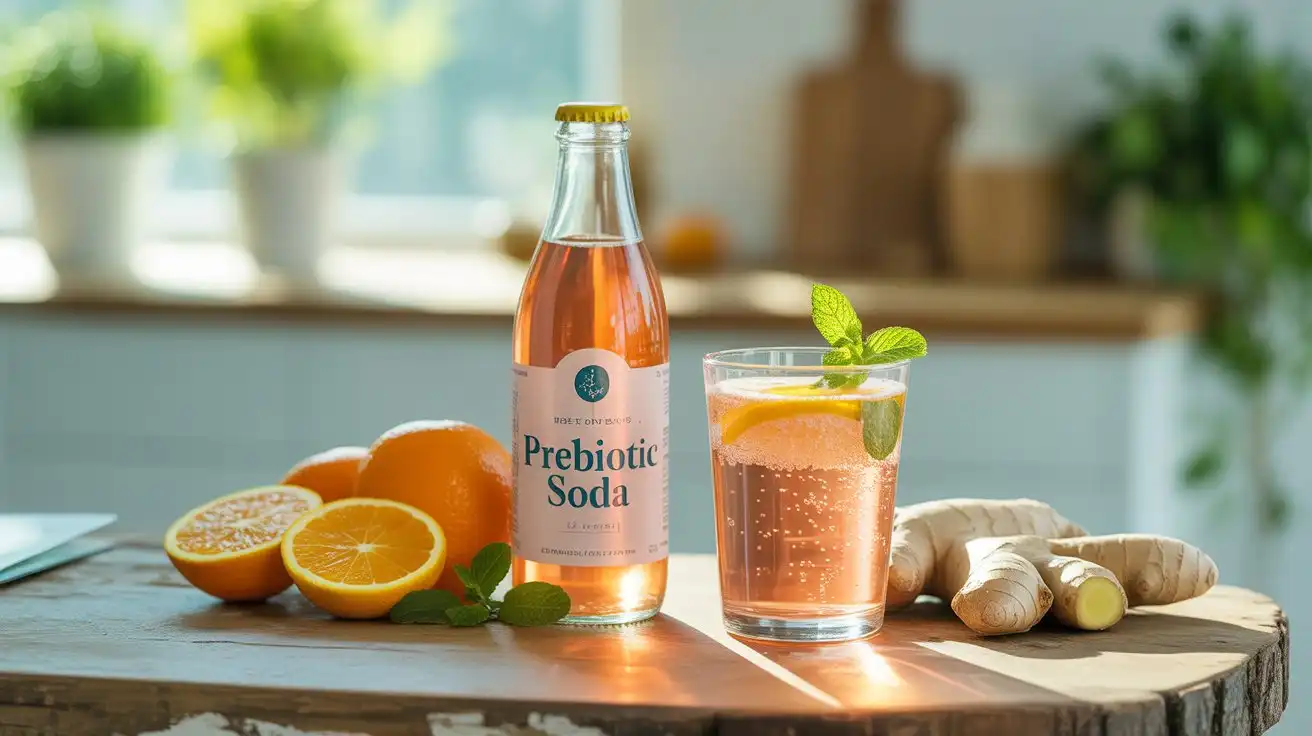In recent years, the health and wellness industry has seen a surge in popularity of functional beverages that offer more than just hydration. Among these innovative drinks, prebiotic soda have become a favorite for many looking to improve their digestive health while enjoying a refreshing beverage. Prebiotic sodas are touted as a healthier alternative to traditional sugary sodas, and they come with the added benefit of promoting gut health. But what exactly is prebiotic soda, and how can it benefit your digestive system? In this article, we will dive into the world of prebiotic soda, explore its benefits, and answer common questions about its effects on the body.
1. What is Prebiotic Soda?
Prebiotic soda is a type of carbonated drink that contains prebiotics—naturally occurring fibers and plant-based compounds that help feed the beneficial bacteria in your gut. Unlike probiotics, which are live bacteria that contribute to the gut microbiome, prebiotics serve as food for these bacteria, helping to nourish and support their growth and activity.
Prebiotic sodas often contain ingredients such as inulin (a type of fiber found in plants), FOS (fructooligosaccharides), and acacia fiber, which are all known to have prebiotic properties. These ingredients work by stimulating the growth of good bacteria, such as Bifidobacteria and Lactobacilli, which play a crucial role in digestion, immunity, and overall health.
What sets prebiotic sodas apart from traditional sodas is their formulation—while regular sodas are high in sugar and can disrupt gut health, prebiotic sodas offer a healthier alternative, promoting digestive balance without the negative effects of excessive sugar.
2. Prebiotic Soda Benefits: Why It’s Good for Your Digestive Health
Prebiotic sodas offer several health benefits, especially in terms of maintaining a healthy gut. Here are some of the top reasons why adding prebiotic soda to your diet can be a great choice for digestive health:
A. Supports Gut Health and Digestion
One of the primary benefits of prebiotic soda is its ability to support the growth of beneficial gut bacteria. A healthy balance of gut microbiota is essential for proper digestion and nutrient absorption. The prebiotic fibers in these sodas act as food for the good bacteria in your gut, helping to maintain a balanced microbiome. This can lead to improved digestion, reduced bloating, and better overall gut function.
B. Improves Regularity and Relieves Constipation
Prebiotics can help promote regular bowel movements by increasing the production of short-chain fatty acids (SCFAs), which are produced by beneficial bacteria as they digest fiber. SCFAs play a role in stimulating intestinal motility, helping to relieve constipation and promote regularity. As a result, prebiotic soda may help you maintain a healthy digestive rhythm and prevent digestive discomfort.
C. Boosts Immune Function
A significant portion of the immune system resides in the gut. By supporting a healthy gut microbiome, prebiotics help strengthen the immune system. The good bacteria in your gut are involved in the production of immune cells that help protect against harmful pathogens. Consuming prebiotic soda may, therefore, provide a natural boost to your immune defenses.
D. Promotes Gut-Brain Communication
Emerging research suggests that the gut and brain are closely connected through a pathway known as the gut-brain axis. A healthy gut microbiome has been shown to positively influence mental health, mood, and cognitive function. By feeding the beneficial bacteria with prebiotics, prebiotic soda may contribute to better brain health and even help alleviate symptoms of anxiety and depression.
E. Helps with Weight Management
Prebiotics may aid in weight management by enhancing feelings of fullness. As prebiotics ferment in the gut, they produce gases and short-chain fatty acids that promote satiety, helping to reduce overall calorie intake. By drinking prebiotic soda as part of a balanced diet, you may feel more satisfied after meals, making it easier to manage your weight over time.
3. Does Prebiotic Soda Make You Poop?
One of the common questions people have about prebiotic soda is whether it can help with bowel movements. The answer is yes—prebiotic soda can help you poop by promoting regularity and relieving constipation. The prebiotics in the soda stimulate the growth of beneficial bacteria that are involved in the fermentation process, which produces short-chain fatty acids that enhance gut motility.
That said, the effects of prebiotic soda on bowel movements can vary depending on the individual. Some people may notice an improvement in digestion and more regular bowel movements, while others may experience mild bloating or gas as their gut adjusts to the increased fiber intake. It’s important to drink prebiotic soda in moderation and gradually introduce it into your diet if you’re new to prebiotics.
4. Prebiotic Soda Side Effects
While prebiotic soda can offer numerous health benefits, it’s important to be aware of potential side effects, especially if you’re not accustomed to consuming prebiotics regularly. Here are some possible side effects of prebiotic soda:
- Gas and bloating: The fermentation of prebiotic fibers in the gut can produce gas, leading to bloating or discomfort in some individuals. If you’re new to prebiotics, it’s recommended to start with small amounts of prebiotic soda and gradually increase your intake.
- Diarrhea or digestive upset: In some cases, consuming too much prebiotic soda at once can lead to diarrhea or an upset stomach. This is particularly true for people who are sensitive to fiber or have conditions like irritable bowel syndrome (IBS). It’s best to drink prebiotic soda in moderation and listen to your body’s cues.
5. Prebiotic vs Probiotic: What’s the Difference?
Both prebiotics and probiotics are essential for gut health, but they serve different functions:
- Prebiotics are non-digestible fibers that feed the beneficial bacteria in your gut, promoting their growth and activity. Prebiotics help improve digestion, support the immune system, and regulate bowel movements.
- Probiotics are live bacteria that provide health benefits when consumed in adequate amounts. They directly populate your gut with good bacteria, helping to balance the microbiome and prevent the overgrowth of harmful microorganisms.
While probiotics introduce beneficial bacteria into the gut, prebiotics feed and nourish these bacteria, allowing them to thrive and perform their essential functions. Both are important for a healthy digestive system, and consuming them together can provide synergistic benefits.
6. Prebiotic Soda Brands: Which Ones Should You Try?
Several brands have entered the market, offering prebiotic sodas with various flavors and formulations. Some popular prebiotic soda brands include:
- Olipop: Known for its range of low-sugar prebiotic sodas, Olipop uses ingredients like prebiotic fiber, herbs, and natural sweeteners to support digestive health.
- Perricone MD: This brand offers prebiotic sodas made with plant-based ingredients designed to promote gut health and support hydration.
- Health-Ade: Famous for its kombucha, Health-Ade also offers prebiotic sodas that combine probiotics and prebiotics for a balanced gut.
- Better Booch: Specializing in kombucha-based prebiotic sodas, Better Booch incorporates a variety of plant-based prebiotics to support digestion and overall wellness.
When choosing a prebiotic soda, be sure to look for products with minimal added sugar and artificial ingredients. Opt for brands that use natural sweeteners like stevia or monk fruit to keep your beverage healthier.
7. Prebiotic Drinks: Other Options for Gut Health
If you enjoy prebiotic sodas, there are other prebiotic drinks that can help support digestive health. Some of the most common options include:
- Kombucha: A fermented tea that contains both probiotics and prebiotics, kombucha is a great way to support gut health.
- Kvass: A traditional fermented beverage made from rye bread, kvass is rich in prebiotics and can promote healthy digestion.
- Prebiotic teas: Certain herbal teas, such as those made with chicory root or dandelion root, contain natural prebiotics that help nourish the gut.
8. Prebiotic Foods: What to Include in Your Diet
In addition to prebiotic sodas, there are plenty of foods that naturally contain prebiotics. Some of the best prebiotic foods include:
- Garlic: Rich in inulin, garlic is one of the top sources of prebiotics.
- Onions: Another great source of inulin, onions promote the growth of beneficial gut bacteria.
- Bananas: Unripe bananas contain resistant starch, a type of prebiotic fiber that supports gut health.
- Asparagus: A natural source of inulin and other prebiotic fibers, asparagus can support digestion and immune function.
- Leeks: High in inulin, leeks are excellent for feeding beneficial bacteria in the gut.
Incorporating these prebiotic-rich foods into your diet, along with prebiotic sodas, can help maintain a healthy gut microbiome and improve overall digestive health.






Be First to Comment